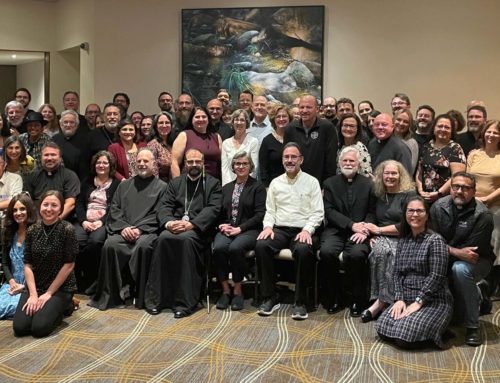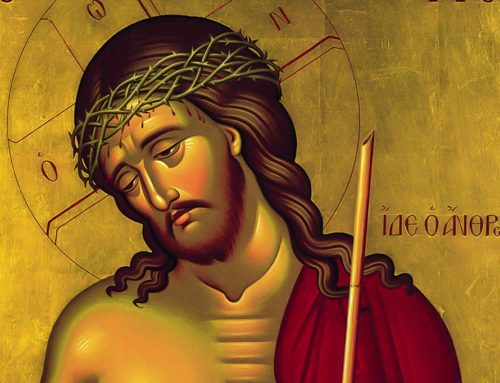The following reflections were written by a young priest, with the help of his wife (who wish to remain anonymous) about 10 years ago, with some recent additions. You may not necessarily agree with all of the items, and you may have more to add. The reflections represent the thoughts and experiences of one Orthodox clergy couple in the Greek Orthodox Archdiocese of America and not necessarily those of this Website.
The Priesthood has many joys, blessings and satisfactions. We (Presvytera and I) would never trade our ministries for any other work or career as it is a calling from God that we have answered wholeheartedly.
However, we should all be better equipped for the challenges that await us in parish life.
Here are some things to bear in mind and not be discouraged by:
- “No” is a complete sentence. You do not have to constantly explain yourself as a pastor or as a presvytera.
- You do not have to answer every question in detail and with specifics.
- People lie to priests as well as tell them the truth. Don’t be stunned if the former occurs more than the latter.
- Sometimes your own brother priests will disappoint you.
- Lay people are expert lay theologians. If you have 100 families in your parish, you may inherit 100 “theologians.”
- When you wear the collar in public, people will stare at you. When you wear it and hold your wife’s hand, they will stare longer.
- If you want to be an objective, fair and effective pastor, consider the idea that you really have no “friends” in your parish.
- The quickest way to be successful and stay there is to love the people. Compassion is a scarce commodity in the secular world. Jesus loved the people.
- Being with my family at dinner time is a sacrament. It is up to me to spell sacrament with ALL CAPS and to remind my parishioners that I do so.
- If anyone offers a gift to you as pastor or to your parish, accept it with love and gratitude no matter how trivial, torn, tattered, or tiny it may be.
- You may think that some academic courses are more important than others to earn high grades in, but in the parish you will be graded on your ability to preach and teach (Homiletics and Religious Education), manage the office (Parish Administration), do youth work (Youth Ministry), provide care to the sick and needy (Hospital Ministry and Pastoral Care) and chant (Byzantine Music). Parishioners may “grade” you on how you make them think and feel about themselves, their parish, their loved ones and their faith.
- Do not preach or say anything negative from the pulpit, ever. It is for the Word of God.
- When someone asks you to do something, always consider the short and long-term consequences. No matter how insignificant your decision, action or inaction may seem to you, it is probably important to them and it will affect others too, as well as set a precedent for your ministry.
- If you want to win over cynical and critical adults, win over their children and grandchildren first.
- When speaking about stewardship, avoid the use of the word “money” as much as possible. Use words like time, talent, treasure instead.
- How you look and speak always makes an impression on people. Don’t deny your parishioners your visible and outer beauty–just stress to them that it is less important than the invisible and inner beauty.
- Managing time is a misnomer–managing people is a more accurate term for the task.
- You are primarily procured to proffer your presence and prayers as pastor and priest. Being there for your people is 80% of the job–don’t underestimate this.
- Do not apologize for what you do. Your calling is a divine institution that you have answered. “I have chosen you,” said Jesus.
- “Be a servant, but do not be servile.” ( John Chrysostom, On the Priesthood)
- Not intervening (except through prayer) in the personal squabbles of your parishioners is an “active decision.” Remember that they have to live with each other and they will quite probably reconcile. If you become judge and jury, your sentence upon them can be impossible for them to forgive or forget. You have few, if any, true friends as pastor.
- To your parishioners you are Priest and Presvytera whether you are on church ground, the play ground, school ground or at the Ground Round!” Just because you have a “day off” and you are not in uniform, you still need to maintain the “priestly demeanor,” for their sake and for your own.
- When people give you compliments, do not take them to heart. When people criticize you, do not take it to heart. Both compliments and complaints are from limited perspectives of the person making them.
- Sometimes when you get a “promotion” in the ecclesiastical hierarchy, you will take a cut in pay. . .”the more spiritual, the less material.”
- There is a beautiful “mistress” that is always beckoning you as pastor–she is your parish. DO NOT LET HER BECOME YOUR CONCUBINE AND REPLACE YOUR WIFE AND FAMILY. MAKE DATE NIGHTS WITH YOUR SPOUSE AND KEEP THEM. TAKE YOUR FAMILY VACATION.
- When you compose the Annual Church Calendar of events insert into it your personal calendar first. Put in your wife’s birthday, your anniversary, your children’s birthdays, and vacation time. These too, are sacraments.
- If someone tells you something in secret, it probably is gossip disguised as a personal attempt to draw you into their vortex. Do not get sucked in! Gently tell them to spread the Gospel, not gossip! Walk away; shut your ears, etc.
- In every parish there is a line of authority and a line or sphere of influence. In the beginning of your parish ministry, you will not have both in your possession.
- Never handle cash in public in the church. Do not make change for people at the Stay away from the pangari!
- Leadership is lonely. . . but you have Christ and you have your fellow brethren clergy and sisterhood of presvyteres. Develop a relationship with a peer and a mentor/father confessor and call up on them as needed for support and wisdom. Do not steer the ship alone all the time.
- The ability to say “No” is the challenge and mark of a leader. Anyone can say “yes.”
- I you want to be an authority, you have to respect the authority above you—your hierarch and the Lord
- You cannot solve people’s personal problems; you can only walk with them through their problems for a while.
- Just because you offer a spiritual prescription, do not expect the patient to take it.
- “Yiayia” is a more influential and powerful theologian than you are
- A pastor is a leader. He leads by example.
- Leaders are visible and sometimes invisible.
- Leaders lead and bleed and are “hung out for all to see.”
- Leaders get sick if they do not tend to their own physical and spiritual health (Your day off is necessary–even God needed one).
- Leaders laugh and cry, rise and fall, are welcomed and sent off.
- Leaders are envied and emulated.
- Leaders are human; only One is Divine.
If you do nothing at all or do not know what to do, ask yourself what Jesus would do and just pray with all your heart, mind and soul.
You are a priest forever according to the order of Melchizedek, but you are also a son, a sibling perhaps, and if you are not celibate- a husband and/or biological/adoptive father
And remember… “Be valiant and strong, do not fear nor be afraid nor be terrified before them; for the Lord your God goes with you; He is the One Who goes before you. He will be with you, He will not leave you nor forsake you.” (Deuteronomy 31:6)






Leave A Comment
You must be logged in to post a comment.